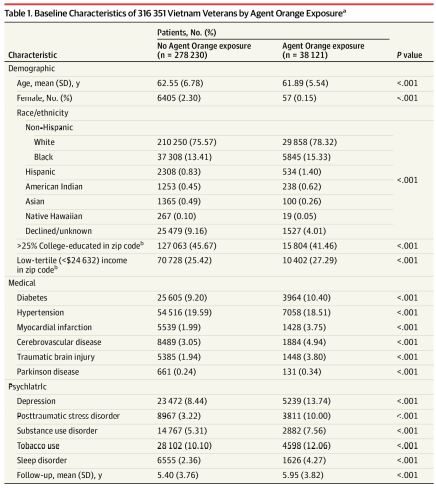Opposition From VA Leadership Delayed Additions
 WASHINGTON — Having three new illnesses added to the list of conditions presumed related to Agent Orange exposure—– was a hard-fought battle by veterans’ advocates, who faced opposition and delays from VA leadership and federal budget managers.
WASHINGTON — Having three new illnesses added to the list of conditions presumed related to Agent Orange exposure—– was a hard-fought battle by veterans’ advocates, who faced opposition and delays from VA leadership and federal budget managers.
The inclusion of bladder disease, hypothyroidism and Parkinson’s-like symptoms was part of the $740 billion 2021 National Defense Authorization Act. Those bring the number of Agent Orange presumptive conditions to 17, though that total could grow in the near future.
The same month as these three conditions were added, a new study was released that links Agent Orange exposure to yet another illness being faced by Vietnam-era veterans—dementia.
For years, evidence has been presented, demonstrating a link between exposure to the toxic defoliant and bladder disease, hypothyroidism and Parkinson’s-like symptoms. A 2014 report from the National Academies of Science, Engineering and Medicine on the effects of Agent Orange found limited or suggestive evidence of an association with hypothyroidism and bladder cancer, and broadened the definition of Parkinson’s disease, which was already recognized as a presumed condition, to include Parkinson’s-like symptoms or Parkinsonism. In 2019, NASEM upgraded hypothyroidism and bladder cancer to “sufficient evidence of an association.”
Each new report from NASEM was accompanied by calls from veterans, advocacy groups and legislators for VA to add these diseases to its presumptive conditions list. Time and again they were given the answer that the science was not secure or that the budget was too tight.
Documents released as part of a Freedom of Information Act request, show that, in 2017, then-VA Secretary David Shulkin attempted to add the three conditions to the presumptive list, but the Office of Management and Budget challenged the NASEM findings as well as Shulkin’s authority to add the conditions. OMB also expressed concerns about the cost of adding the conditions, which have bene diagnosed in about 83,000 Vietnam veterans with Agent Orange exposure. While many of those veterans are already receiving full disability for other conditions, VA estimated that the new presumptions could increase benefits for as many as 34,000 veterans.
In an email to OMB Director Mick Mulvaney, Shulkin wrote, “Given the research and scientific variables surrounding Agent Orange exposure and the significance of this matter to veterans and their families, it is imperative to add these [conditions].”
When OMB’s actions were revealed in 2019, legislators wrote to Mulvaney, demanding his department cease its interference. That issue might have been beside the point, however, because then-Secretary Robert Wilkie told legislators that VA would be waiting on the results of its own studies—the Vietnam Era Health Retrospective Observational Study and the Vietnam Era Mortality Study—before making a decision. The results of those studies have been pushed back numerous times over the last two years. The most recent estimate from VA puts their release at mid-2021 or later.
History of Red Tape
It was this history of delays and red tape that spurred legislators to take the decision out of VA’s hands. The measure to include the new Agent Orange presumptions as part of the NDAA passed the Senate in July with a vote of 94-6 and was signed into law in January 2021 after a Congressional override of President Donald Trump’s veto of the defense budget.
Advocates also were pushing to include hypertension in the new presumptive list. A 2018 NASEM report upgraded hypertension from the “limited or suggestive” category to the “sufficient” category, indicating there is enough evidence to conclude a positive link between disease and exposure.
While hypertension was a part of early discussions by legislators, it was eventually dropped from the final bill. It is estimated that more than 150,000 Vietnam-era veterans who were exposed to Agent Orange have been diagnosed with high blood pressure.
Now VA will have a new Agent Orange-related condition to consider. A report published in the January issue of JAMA Neurology found that veterans who had been exposed to Agent Orange were twice as likely to develop dementia and to receive their diagnoses earlier.
Researchers at the San Francisco VA Healthcare System and colleagues looked at data on VA patients who were treated between 2001 and 2015, taking a 2% random sample of Vietnam-era patients who did not have dementia at baseline. Of the 316,351 patients analyzed, 12.1% had presumed Agent Orange exposure.
The results indicated that 5% of patients who had been exposed developed dementia compared to only 2.5% of their nonexposed counterparts over a similar timeframe. The study also found that veterans exposed to Agent Orange were diagnosed with dementia an average of 15 months earlier.
Authors of the brief report published in JAMA Neurology were not conclusive on how exactly exposure would lead to cognitive problems later in life. They posited that dioxin, one of Agent Orange’s chief ingredients, might play a role, however. The presence of dioxin, which can be stored in fat tissue where it remains in the body for years, has been shown to cause damage in various areas of the brain, and higher levels have been associated with worse verbal memory. Agent Orange also has been linked with conditions like diabetes and Parkinson’s disease, both of which are established dementia risk factors.1
Additional research will be needed to determine the exact mechanism at work, the authors concluded. But in the meantime, they recommended that veterans with a history of Agent Orange exposure should be on the look out for symptoms of cognitive decline and be screened and treated for dementia as they age.
- Martinez S, Yaffe K, Li Y, Byers AL, Peltz CB, Barnes DE. Agent Orange Exposure and Dementia Diagnosis in U.S. Veterans of the Vietnam Era. JAMA Neurol. Published online Jan. 25, 2021. doi:10.1001/jamaneurol.2020.5011
